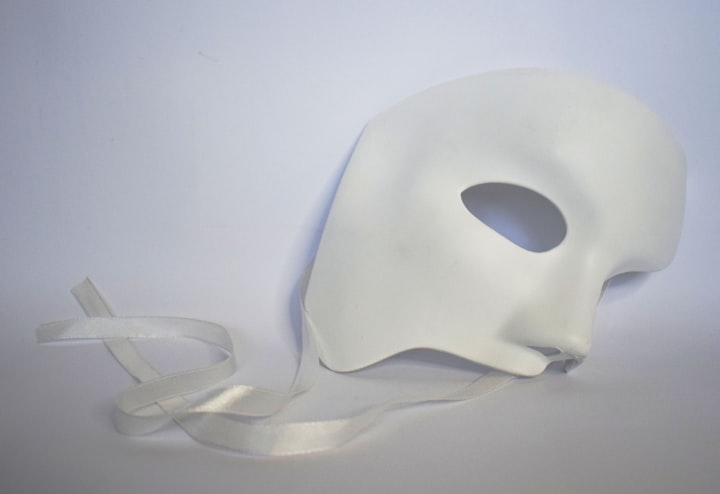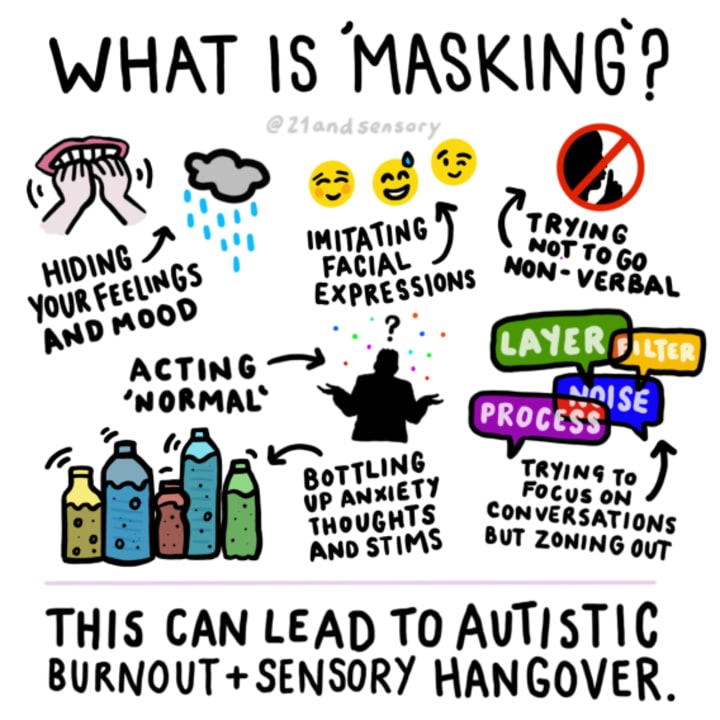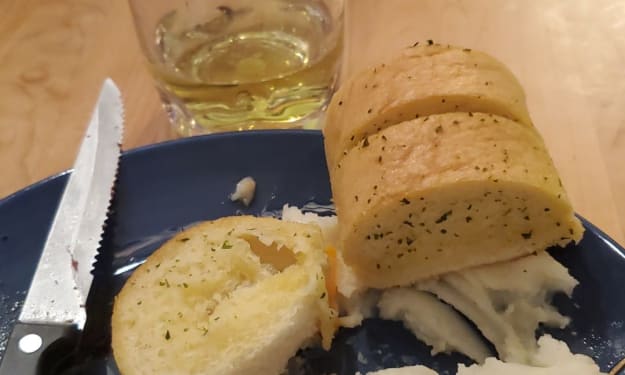Masquerade: On Learning to Live as an Autistic Woman
Autistic Burnout stole years of my life. It isn't getting 2021.

Masquerade! Paper faces on parade. Masquerade. Hide your face so the world will never find you.
When I was seven, I read an abridged version of Phantom of the Opera. The musical happened to be coming to town, so my dad took me. From that moment forward, Phantom was all I talked about for years.
I memorized the entire libretto, draw pictures that I smashed into my desk, and screamed the last note of the title song until I learned how to sing.

Whenever anyone describes me during these years of my life, they say "I was in my own world," and sometimes wouldn't even respond to my own name. I didn't have many friends, and I didn't really want them either. I was content being on my own. During outdoor recess, I climbed up and down a metal jungle gym in the shape of a rocket singing and imagining I was a character in a story that evolved in my head. Classmates would stop and ask me if I was the "r" word. I wasn't hurt and honestly just wanted them to leave me alone so I could return to the story in my head, which was far more interesting.
A solar system puzzle was what I went to every time we had indoor recess. At first, I couldn't finish the puzzle by the end of recess. By the end of the year, I could do it with my eyes closed. I never grew bored of it. The most upset I had ever been was when a boy, Robbie, took the box and hid it. I cried trying to get it back, feeling like an extension of myself had been torn from me. '
Unbeknownst to me, the adults in my life were discussing my spelling tests. How I would finish writing two words and then draw all over the rest of the page. They were discussing what the next move was.
ADHD and autism were not able to be co-diagnosed until 2013. But my mom was convinced I had both throughout the diagnostic process, even after I was diagnosed with ADHD.
The day I realized other kids didn't like me was when I was on the swingset reading and a group of girls came up and sang a song they wrote about how much they hated me. I cried the rest of the day.
"You were very badly behaved today," the PE teacher told me when we were lining up to leave the gym. I was confused. All we did was throw scarves in the air for an hour. She didn't tell me why or give me a chance to ask why. I just knew I did something wrong.

"You know they're making fun of you, right?" a girl said after lunch in high school. The friends I had been sitting with had dispersed. I was kneeling to get my textbooks out of my disaster of a locker.
My friends were all 2009 scene kids, and I had been trying hard to fit in. That day, I showed off my glittery black fingernails. Well, the nail polish had dried to a gray sheer color, but to me, I felt like that was pretty badass and would win some points. They were quick to point out that they were gray and questioned why I thought they were black instead.
I didn't, but they were my friends. It had taken a long time to get those. I smiled and said, "It's fine." I was confused.
Today, they've all grown up to be amazing people.
When I learned about autism, I was taught that it was characterized by black-and-white thinking and lack of empathy, so I didn't think I was autistic.
I sang throughout high school, and made it into auditioned choirs, musicals, and eventually, Phantom of the Opera my senior year. Every day when I got home from school, I belted my mezzo-soprano diaphragm away while I paced in circles around the house.
I never really interacted in group settings, including rehearsal. However much I wanted to, I felt like my brain couldn't come up with words fast enough to socialize with others in choir. Worse, I felt like an uncoordinated baby giraffe unless I was dancing.
Deeply insecure, I started to pay attention to how people moved and spoke. How conversations naturally played out. Before 5th grade, I had little interest in conforming. After that, I started to become aware of how different I was from everyone else.
Masquerade! Seething shadows , breathing lies. Masquerade. You can fool any friend who ever knew you.

By college, you could only tell I wasn't neurotypical by how my eye contact would flicker to small distractions around the room. I still sang and paced, but started to feel much more vulnerable because I didn't have a space no one could hear me in, so I did it less.
I graduated college with a high honors double degree in English and anthropology, and I'm only flexing because some kid once asked if I would ever get past first grade. But despite achieving so much, I felt empty. Drained. College had been amazing for me. And it was over. I spent four years taking classes simply because I was interested in all of them.
I lost access to my ADHD medication my junior year for my ADHD diagnosis records "not being enough" to transfer to my university pharmacy. I wouldn't get them back until my second hospitalization in March 2018. Despite it being significantly harder to do things, I pushed through the executive dysfunction and still got out with high honors.

It came at a cost, though. I graduated, but I collapsed afterwards, ending up in a behavioral health hospital for being suicidal five months later.
My ability to socialize healthily changed slowly. It started with my brain speed slowing down, and I found that sometimes it was hard for me to put words together. I started writing things out since I seemed to be able to communicate better that way.
Making office friends felt awkward because I didn't know where the line between personal and professional was. And tried to be normal and productive, even when my mental health symptoms were more obvious. There wasn't a way to discuss being overwhelmed without feeling like I was whining. Group settings were the worst because my brain didn't work fast enough to contribute anything meaningful to the evolving conversation. It was like rehearsals, but with more pressure.
So began four years losing more and more energy, commuting three hours every day to downtown Chicago for work, coming home to a basement roach-infested apartment. I had no energy to be creative. It was too disgusting to pace like I did to think. I stopped singing. I was so tired.
My ability to conflict resolve took a hit, and I found myself in situations I was accused of being manipulative or toxic, and I didn't understand because I consistently tried to be as direct and considerate as I could. I was amazing at moderating Facebook groups for a while and could conflict resolve between members as a neutral party. But whenever I needed to advocate for myself, it fell.
And it happened again and again and again. I stood up for myself and was pinned as manipulative. I looked up "How to stop being manipulative" every time, and only grew more and more desperate to explain and be as transparent as possible. It felt like I was speaking another language.
Once you're accused of being manipulative, it is very hard to defend yourself. I felt damned if I did and damned if I didn't. And it is hard. It is so hard to talk about because even when writing this, I feel like I'm going to come across as manipulative and whiny. But because this shared autistic experience was what meant the most to me, I feel like I should write about it.
I asked for help in an abusive situation, and it violently backfired on New Year's Eve 2019. I shared too much. I meddled. But I was desperate and I attemped suicide. This detonated so badly I lost housing and stayed with a friend's family for 10 months through the COVID pandemic.
And the entire time, I wondered what was wrong with me. Why was I so manipulative? What was I doing wrong? I explained and explained and explained and no one seemed to read what I was writing. It hurt so much. I meant every word I wrote literally, and started things with "Please read me 100% literally." That did not work.
Faces. Take your turn, take a ride on the merry-go-round in an inhuman race.
Eye of gold. Thigh of blue. True is false. Who is who. Curl of lip. Swirl of gown. Ace of hearts. Face of clown.
Faces. Drink it in, drink it up, till you've drowned in the light, in the sound.
Everything took so much effort in 2020. My mental health and depression improved, but my brain felt gray. I felt like I didn't have thoughts anymore, and my limbs felt like weights were tied to them doing basic things. Nothing was wrong. I wasn't depressed. I was nothing most of the time. Interacting with the family I lived with grew harder and harder, as did keeping in touch with loved ones. It wasn't that I was pushing anyone away. It was like my body didn't remember to have the energy.
Too much stimulation would result in wiping me out for days. I had a meltdown in a grocery store trying to choose a reusable water bottle.
Talking to my therapist was difficult because I couldn't identify anything that was wrong.

When I was called manipulative again, it hurt. But for the first time, I didn't ask myself what was wrong with me. It always felt like my words were a color everyone else could see but I couldn't. Why? I didn't understand, but I wanted to. That was the thing. I wanted to understand. I didn't want to control anyone. I wanted to understand their pain without minimizing mine.
I believed every situation could be reasoned out. I took people at their word and was devastated when I wasn't taken at mine. I didn't understand why people looked for other meanings in my words.
I looked up if anyone had the same experience. And a blog post on autism popped up (I actually don't remember the link, sorry!) that eerily matched my own experience. As I flipped through sources written for and by autistic people, I sobbed. I spoke to my therapist the next day and took several tests she sent me: I scored on the spectrum every time. Pursuing a clinical diagnosis is incredibly hard for an adult woman, but right now, I need my therapist and rest.
I've always known there was more than ADHD, but I didn't want to consider autism. It felt like admitting there was something else different about me. Something else that could be used to invalidate me. But I found out I was autistic when I reached a point accepting it felt like a comforting hug.

What does wellness mean then? I'm writing this because of the contest being called "A Fresh Start."
I love my life. I have two adorable birds and a cat. I live with an incredible partner with whom I had actually broken up with six years ago. He reminds me that our breakup was messy, but we ended up friends again, didn't we? We never fell out of love with each other, but we grew up a lot in those six years. Our communication is honest and compassionate. We resolve issues by sitting down and talking with stark transparency. I am living the most amazing love story, and I'm happy. It took hell to get here.
I've always walked loudly despite being 118 points of anxiety. My partner told me to put on my Doc Martins the next time I felt insecure about it and stomp around the house.
I'm an autistic woman. An adult tired of being treated like a petty child. And this year, I have a new way to learn to love and take care of myself. I can take care of my sensory overload and autistic burnout and grow from there. I can't get back the 20 years of not knowing I'm autistic.
My mind never casts someone as manipulative or bad or unredeemable. That's just how my mind works. Not everyone's does, and nothing I do is going to uncast me as a manipulative person in other's narratives. I'm not going to learn that overnight, but I'm keeping the people in my life who commit to understanding me and understand that I'll do the same for them. And I have those people. I'm keeping them close.

My 2021 start isn't fresh, but it is a start. I thought nothing would work or make me less tired. And now I know there is so much I haven't tried. I didn't know how to take care of myself before.
I started singing again. Not much, but I danced with the cat this morning singing Disney songs. She tolerated it.
Masquerade was never one of my favorite Phantom songs growing up, but when I performed it in high school, I realized the lyrics didn't match the tone. The lyrics are sad and dark while the melody is celebratory. Like the song itself is wearing a mask. And that resonated with me in a way I couldn't explain. Now I know why.
I'm making it a point to breathe and fidget. I've started doing yoga more. I scheduled snack breaks so I don't forget to eat. Not to brag or anything, but I put together dinner for my partner and me that had protein and vegetables. And no, it wasn't a pizza. We ate pizza the day after.
Sessions with my therapist are more involved. I read more and think more. I feel rosebuds of color and energy. I've started reaching out to friends and family more. It isn't much, and I'm not going to recover overnight.
But I'm going to recover.
All lyrics are from Masquerade, Act II, Scene I of Phantom of the Opera; Written by Andrew Lloyd Webber and Richard Stilgoe
About the Creator
Alexa Baczak
I woke up this morning with too many thoughts, and I'm going to make it everyone's problem | alexabaczak.com | alexabaczak.substack.com/welcome






Comments
There are no comments for this story
Be the first to respond and start the conversation.